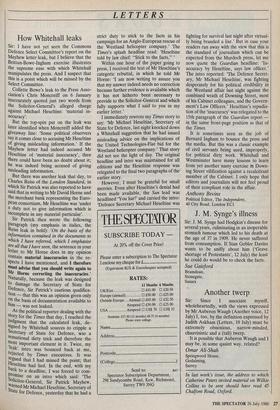LETTERS How Whitehall leaks
Sir: I have not yet seen the Commons Defence Select Committee's report on the Mayhew letter leak, but I believe that the Brittan-Bowe-Ingham exercise illustrates the supreme ease with which Whitehall manipulates the press. And I suspect that this is a point which will be missed by the Select Committee.
Collette Bowe's leak to the Press Asso- ciation's Chris Moncreiff on 6 January inaccurately quoted just two words from the Solicitor-General's alleged charge against Michael Heseltine: `material in- accuracy'.
But the top-spin put on the leak was later identified when Moncreiff added the giveaway line: `Some political observers say it comes close to accusing Mr Heseltine of giving misleading information.' If the Mayhew letter had indeed accused Mr Heseltine of `material inaccuracy', then there could have been no doubt about it; he was indeed being accused of giving misleading information. But there was another leak that day, to Charles Reiss of the London Standard, in which Sir Patrick was also reported to have said that in writing to Mr David Horne and the merchant bank representing the Euro- pean consortium, Mr Heseltine was `under a duty not to give information which is incomplete in any material particular'. Sir Patrick then wrote the following paragraph (my emphasis in italics, the Reiss leak in bold): 'On the basis of the information contained in the documents to which I have referred, which I emphasise are all that I have seen, the sentence in your letter to Mr Horne does in my opinion contain material inaccuracies in the re- sPects I have mentioned, and I therefore Must advise that you should write again to Mr Horne correcting the inaccuracies.' Naturally, because the leak was designed to damage the Secretary of State for Defence, Sir Patrick's cautious qualifica- tion — that this was an opinion given only on the basis of documentation available to him — was not leaked.
As the political reporter dealing with the story for the Times that day, I reached the judgment that the calculated leak, de- signed by Whitehall sources .to cripple a Secretary of State for Defence, was a sensational dirty trick and therefore the most important element in it. Twice, my leak' intro was bounced back at me, rejected by Times executives. It was argued that I had missed the point; that Heseltine had lied, In the end, with my back to a deadline, I was forced to com- promise on an intro which said: The Solicitor-General, Sir Patrick Mayhew, arned Mr Michael Heseltine, Secretary of State for Defence, yesterday that he had a strict duty to stick to the facts in his campaign for an Anglo-European rescue of the Westland helicopter company.' The Times's splash headline read: `Heseltine told by law chief: "Stick to the facts." ' Within one hour of the paper going to press, I received the text of Mr Heseltine's categoric rebuttal, in which he told Mr Home: 'I am now writing to assure you that my answer indeed needs no correction because further evidence is available which it has not hitherto been necessary to provide to the Solicitor-General and which fully supports what I said to you in my earlier letter.'
I immediately rewrote my Times story to say: 'Mr Michael Heseltine, Secretary of State for Defence, last night knocked down a Whitehall suggestion that he had issued misleading advice on the implications of the United Technologies-Fiat bid for the Westland helicopter company.' That story did not see the light of day. The original headline and intro was maintained for all editions and the Heseltine response was relegated to the final two paragraphs of the earlier story. However, I must be grateful for small mercies. Even after Heseltine's denial had been made available, the Sun lead was headlined 'You liar!' and carried the intro: Defence Secretary Michael Heseltine was fighting for survival last night after virtual- ly being branded a liar.' But in case your readers run away with the view that this is the standard of journalism which can be expected from the Murdoch press, let me now quote the Guardian headline: 'In- accuracy by Heseltine, says law officer.' The intro reported: 'The Defence Secret- ary, Mr Michael Heseltine, was fighting desperately for his political credibility in the Westland affair last night against the combined wrath of Downing Street, most of his Cabinet colleagues, and the Govern- ment's Law Officers.' Heseltine's repudia- tion of the 'inaccuracy' was relegated to the 15th paragraph of the Guardian report in the same front-page position as that of the Times.
It is sometimes seen as the job of Bernard Ingham to bounce the press and the media. But this was a classic example of civil servants being used, improperly, for political dirty work. Whitehall and Westminster have many lessons to learn from yet another nasty exercise it Down- ing Street vilification against a recalcitrant member of the Cabinet. I only hope that editors and journalists will not feel proud of their compliant role in the affair.
Anthony Bevins
Political Editor, The Independent, 40 City Road, London EC1


















































 Previous page
Previous page